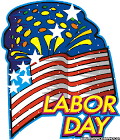 Today is Labor Day. We remember all work: wage earners, independent contractors, entrepreneurs, managers, clergy, and non-profit semi-volunteers. Work is done under a variety of organizations: unions, professional, and none at all. There are multiple paths to success and multiple ways to measure it.
Today is Labor Day. We remember all work: wage earners, independent contractors, entrepreneurs, managers, clergy, and non-profit semi-volunteers. Work is done under a variety of organizations: unions, professional, and none at all. There are multiple paths to success and multiple ways to measure it.
Today we remember Samuel Gompers, the founder of the AFL (later to be merged with the CIO to form the AFL-CIO). This passage from his autobiography tells us how he first started in the labor movement.
by Samuel Gompers
In 1873 came one of the most important changes in my life. I left my old job and found employment with David Hirsch & Company at 122 Chambers Street, then the only union shop in the city. It was also a high-class shop where only the most skilled workmen were employed. David Hirsch was a German “exile.” He had learned the cigarmaking trade in Hamburg when he worked with Karl Laurrell, Louis Baer, and a few others whom I met in his shop. Because he was an active Socialist, he was directed to move from Hamburg. Of course, he was at liberty to move to another German city, but for propaganda purposes the Germans chose to interpret such orders as “exile.” Hirsch came to New York where he started a shop of his own. Soon he was giving employment to some of his fellow-Socialist “exiles.” When I went to the shop, Hirsch was employing between fifty and sixty men. He was a bit autocratic, but on the whole very fair. Some of the employees were members of No. 15. Others belonged to No. 90, which was a German-speaking body. There a new world opened to me. The cigarmakers employed at Hirsch’s were practically all Germans — men of keener mentality and wider thought than any I had met before. They talked and read in German, but there was enough English spoken to enable me to understand that the trade union movement meant to those men something vastly bigger than anything I had ever conceived. Many of them were men who had learned the labor movement in Europe and who were refugees because they were active for the struggle for political as well as economic freedom.
With all the energy and confidence born of my young strength, I talked from my limited experiences — fraternal idealism, the Odd Fellows Order, etc. On labor matters my thought was wild. I had been feeling profoundly the injustice that society meted out to wage-earners. I was familiar with the vocabulary of revolutionists, but I had not yet attained a practical understanding of the scope and the power of economic organization. In truth, neither had the others. We were all groping our way, trying to develop the language, the methods, and the fundamentals of trade unionism. Some had a better understanding — fortunately they were to become my teachers. They are with me in lifelike vividness as I think back over those early days.
Further information on: Labor Day.
Leave a Reply
You must be logged in to post a comment.